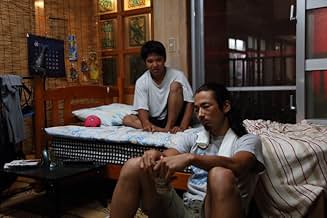Ikari
- 2016
- 2h 22min
CALIFICACIÓN DE IMDb
7.0/10
3.6 k
TU CALIFICACIÓN
Un espeluznante asesinato sin resolver une tres historias aparentemente sin relación en tres ciudades japonesas diferentes.Un espeluznante asesinato sin resolver une tres historias aparentemente sin relación en tres ciudades japonesas diferentes.Un espeluznante asesinato sin resolver une tres historias aparentemente sin relación en tres ciudades japonesas diferentes.
- Dirección
- Guionistas
- Elenco
- Premios
- 4 premios ganados y 21 nominaciones en total
Opiniones destacadas
Even without the vices of lust for money, hate, envy, human beings can be such miserable creatures. This is a heart wrenching drama set in beautiful locations and beautifully acted.
It's a take on the psyche of simple people, when faced with adversity, sometime even not directed at them. It's about love, rage, helplessness, faith, trust and beliefs and how sometimes they get the better of us.
Films like Se7en, Crash come to mind in terms of the effect it leaves behind. And like those films probably I wont muster the desire to watch it again, but I am glad I saw it.
It's a take on the psyche of simple people, when faced with adversity, sometime even not directed at them. It's about love, rage, helplessness, faith, trust and beliefs and how sometimes they get the better of us.
Films like Se7en, Crash come to mind in terms of the effect it leaves behind. And like those films probably I wont muster the desire to watch it again, but I am glad I saw it.
This film begins with a gruesome murder scene, where a man and a woman are found dead in their home. The police traces who the killer is by thumbprints, and the killer's photo is all over the news. Three fugitives' lives, who look like the killer in the photo, are told in the film.
I bought the cinema ticket without knowing what the film was about. And wow, I was blown away by it. I did not expect the story to be so gripping and engaging. Though there are a lot of characters, they are all properly introduced, so that there is no confusion as to who is who. The identity of the killer is kept a secret throughout until the very end, which makes the film suspenseful. I am also positively surprised by the major subplot of two homosexual characters, with a few explicit scenes that I do not normally associate with Japanese films. Furthermore, emotions are very well portrayed in the film, including love, trust, mistrust and very heavy guilt. There are so many heartbreaking scenes that exposes the characters' hurt and deep sadness, making "Ikari" a film to watch and feel. I enjoyed the experience thoroughly.
I bought the cinema ticket without knowing what the film was about. And wow, I was blown away by it. I did not expect the story to be so gripping and engaging. Though there are a lot of characters, they are all properly introduced, so that there is no confusion as to who is who. The identity of the killer is kept a secret throughout until the very end, which makes the film suspenseful. I am also positively surprised by the major subplot of two homosexual characters, with a few explicit scenes that I do not normally associate with Japanese films. Furthermore, emotions are very well portrayed in the film, including love, trust, mistrust and very heavy guilt. There are so many heartbreaking scenes that exposes the characters' hurt and deep sadness, making "Ikari" a film to watch and feel. I enjoyed the experience thoroughly.
RAGE is the second attempt of Lee Sang-il, a Japanese filmmaker of Korean extraction, at adapting Shûichi Yoshida's popular novels, the first being VILLAIN (2010), a critical succès d'estime, both films ostensibly inspect the malaise of a contemporary society built upon a lurid murder case.
A couple is cold-bloodedly liquidated in their home, one year later, three strands (taking place in Chiba, Tokyo, and Okinawa respectively) of narratives are cogently intersected when the police corroborate that the suspect has undergone a facelift and is on the lam, all three story lines will be boiled down to a disintegration between the initially unsuspected and the possible perpetrator, and at the same time, the film meticulously keeps dangling audience with its ever-rotating guessing game.
In Chiba, a girl Aiko (Miyazaki) sloughed from a demimonde background by her father Yohei (Watanabe), strikes a relationship with Tetsuya (Matsuyama), a reticent young man with his past concealed; in Tokyo, a self-dependent gay man Yuma (Tsumabuki), lays his eyes on a reedy Naoto (Ayano) in his usual cruising haunt, after their first penetration, Yuma invites a homeless Naoto to live with him, but the latter remains unforthcoming to a fault; in Okinawa, drifter Shingo Tanaka (Moriyama) is hidden on a small island, after chancing upon a newly-arrived young girl Izumi (Hirose) and a local boy Tatsuya (Sakumoto), their fate will go through shifting sands when an unfortunate tragedy occurs.
Thus, Lee plies audience with 3 candidates of the murderer: Tetsuya, Naoto and Shingo, and cunningly teases viewers with alternate possibilities by dint of coalescing these three's attributes into one photoshopped end product (only one revealing shot in the elevator brazenly belies the eventually misled whodunit), actually, the film is not so much a police procedural as a carefully designed weepie gauging the tenuous degree of trust among human interactions, at least in the paralleled stories of Chiba and Tokyo, the issue of trusting the one you love in spite of his carapace hammers home in a treacly manner albeit two terrific performances from Miyazaki and Tsumabuki, the former blends convincingly her unadulterated immaturity with searing vulnerability whereas the latter, palpably inputs something warm, sympathetic and enthralling to flesh out a character very easily teetering on the brink of homosexual platitude. On the other hand, a transcendent Moriyama steals the limelight in the Okinawa chapter, where the film thrusts its "rage" mythos to the fore and reveals something rotten entrenched within (a slap to both islanders and foreigners), but newcomer Takara Sakumoto is unfortunate shy of charisma to match his rival here.
As a matter of fact, acting is the movie's strongest suit because the script itself takes liberty with many wanton coincidences and artistic license to facilitate plot progress, for example, is it really necessary to bluntly play up certain characters' taciturnity as if this is the only way to keep audience hooked without spilling the beans? Also, for my money, the movie errs on the side of being mawkish and blasé, other than taking its aim at a more rapier-like appraisal of its intriguing premise (cause of the crime), Lee's film is awash with sizzling emotions (cheek by jowl with Ryuichi Sakamoto's attendant score) but in the end of the day, it doesn't reach the echelon of superiority as far as the ultimate impact is concerned.
A couple is cold-bloodedly liquidated in their home, one year later, three strands (taking place in Chiba, Tokyo, and Okinawa respectively) of narratives are cogently intersected when the police corroborate that the suspect has undergone a facelift and is on the lam, all three story lines will be boiled down to a disintegration between the initially unsuspected and the possible perpetrator, and at the same time, the film meticulously keeps dangling audience with its ever-rotating guessing game.
In Chiba, a girl Aiko (Miyazaki) sloughed from a demimonde background by her father Yohei (Watanabe), strikes a relationship with Tetsuya (Matsuyama), a reticent young man with his past concealed; in Tokyo, a self-dependent gay man Yuma (Tsumabuki), lays his eyes on a reedy Naoto (Ayano) in his usual cruising haunt, after their first penetration, Yuma invites a homeless Naoto to live with him, but the latter remains unforthcoming to a fault; in Okinawa, drifter Shingo Tanaka (Moriyama) is hidden on a small island, after chancing upon a newly-arrived young girl Izumi (Hirose) and a local boy Tatsuya (Sakumoto), their fate will go through shifting sands when an unfortunate tragedy occurs.
Thus, Lee plies audience with 3 candidates of the murderer: Tetsuya, Naoto and Shingo, and cunningly teases viewers with alternate possibilities by dint of coalescing these three's attributes into one photoshopped end product (only one revealing shot in the elevator brazenly belies the eventually misled whodunit), actually, the film is not so much a police procedural as a carefully designed weepie gauging the tenuous degree of trust among human interactions, at least in the paralleled stories of Chiba and Tokyo, the issue of trusting the one you love in spite of his carapace hammers home in a treacly manner albeit two terrific performances from Miyazaki and Tsumabuki, the former blends convincingly her unadulterated immaturity with searing vulnerability whereas the latter, palpably inputs something warm, sympathetic and enthralling to flesh out a character very easily teetering on the brink of homosexual platitude. On the other hand, a transcendent Moriyama steals the limelight in the Okinawa chapter, where the film thrusts its "rage" mythos to the fore and reveals something rotten entrenched within (a slap to both islanders and foreigners), but newcomer Takara Sakumoto is unfortunate shy of charisma to match his rival here.
As a matter of fact, acting is the movie's strongest suit because the script itself takes liberty with many wanton coincidences and artistic license to facilitate plot progress, for example, is it really necessary to bluntly play up certain characters' taciturnity as if this is the only way to keep audience hooked without spilling the beans? Also, for my money, the movie errs on the side of being mawkish and blasé, other than taking its aim at a more rapier-like appraisal of its intriguing premise (cause of the crime), Lee's film is awash with sizzling emotions (cheek by jowl with Ryuichi Sakamoto's attendant score) but in the end of the day, it doesn't reach the echelon of superiority as far as the ultimate impact is concerned.
Saw this film at TIFF (Toronto International Film Festival) yesterday. It is a somewhat lengthy Japanese film (2+ hrs) with strong acting and interesting storyline. Most films covering similar topics--unsolved crime, mysterious loner, young lovers, homosexual relationship--would have ended up clichéd and boring after an hour but this film definitely kept me interested throughout.
Unfortunately, I feel the ending weakens the film. The way the crime details were revealed at the end seemed rushed and wasn't as imaginative as the rest of film. Overall, a good film worth watching if you are looking for a foreign film with crime drama plot.
Unfortunately, I feel the ending weakens the film. The way the crime details were revealed at the end seemed rushed and wasn't as imaginative as the rest of film. Overall, a good film worth watching if you are looking for a foreign film with crime drama plot.
Not to be confused with the Nicolas Cage film with the same movie title, "Rage" follows 3 different story/relationship, each involving 3 main characters within the group, where one of them may end up being the suspect. Of course it involves rage, but also mistrust.
There really aren't that many powerful Japanese films that keep you engaged from start to finish. However, this is one of those rare interesting/powerful films that is definitely worth checking out. It does make you want to keep watching to see how it's going to end and who the suspected killer is that's on the loose.
The film does not hold back at all covering many controversial subjects like homosexuality/gay club prostitution, rape, Okinawa/US Soldier problem. These are actual real-life issues.
This film is definitely not something you watch with your entire family; it will definitely make you feel uncomfortable.
There is nudity and some extremely depressing uncomfortable scenes that is almost too graphic and realistic. I could not help it but cry and REALLY feel for the character, the impact was so big; it will leave you with rage too.
I think the beginning of the film was more powerful than the climax. The climactic scene maybe could have been better... Nevertheless, it is a film that stays with you even days later.
Excellent all-star casting. Aoi Miyazaki really fits the clumsy air-headed prostitute daughter of Ken Watanabe. Satoshi Tsumabuki really put himself out there playing a gay character in the closet. Suzu Hirose, super cute and recently popular actress, playing the girl from Okinawa was quite powerful.
Powerful performances and great music to go with the film.
It is definitely a movie I would put on my top list of Japanese films. Sang-il Lee is definitely also one of the best directors in Japan.
Worth watching!
There really aren't that many powerful Japanese films that keep you engaged from start to finish. However, this is one of those rare interesting/powerful films that is definitely worth checking out. It does make you want to keep watching to see how it's going to end and who the suspected killer is that's on the loose.
The film does not hold back at all covering many controversial subjects like homosexuality/gay club prostitution, rape, Okinawa/US Soldier problem. These are actual real-life issues.
This film is definitely not something you watch with your entire family; it will definitely make you feel uncomfortable.
There is nudity and some extremely depressing uncomfortable scenes that is almost too graphic and realistic. I could not help it but cry and REALLY feel for the character, the impact was so big; it will leave you with rage too.
I think the beginning of the film was more powerful than the climax. The climactic scene maybe could have been better... Nevertheless, it is a film that stays with you even days later.
Excellent all-star casting. Aoi Miyazaki really fits the clumsy air-headed prostitute daughter of Ken Watanabe. Satoshi Tsumabuki really put himself out there playing a gay character in the closet. Suzu Hirose, super cute and recently popular actress, playing the girl from Okinawa was quite powerful.
Powerful performances and great music to go with the film.
It is definitely a movie I would put on my top list of Japanese films. Sang-il Lee is definitely also one of the best directors in Japan.
Worth watching!
¿Sabías que…?
- Bandas sonorasM21 Forgiveness
Written by Ryuichi Sakamoto
Performed by Ryuichi Sakamoto feat. 2Cellos
Courtesy of Sony Music Japan International
Selecciones populares
Inicia sesión para calificar y agrega a la lista de videos para obtener recomendaciones personalizadas
- How long is Rage?Con tecnología de Alexa
Detalles
Taquilla
- Total a nivel mundial
- USD 13,521,593
- Tiempo de ejecución2 horas 22 minutos
- Color
- Mezcla de sonido
- Relación de aspecto
- 2.35 : 1
Contribuir a esta página
Sugiere una edición o agrega el contenido que falta





























